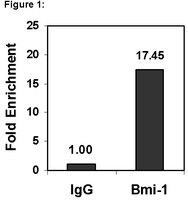16-662 Sigma-AldrichMagna ChIP™ Protein G Magnetic Beads
Recombinant Protein G covalently bound to magnetic beads for use in chromatin immunoprecipitations (ChIP assays). These protein G beads provide users a more rapid, reproducible & efficient reagent for collecting immunocomplexes vs. agarose beads.
More>> Recombinant Protein G covalently bound to magnetic beads for use in chromatin immunoprecipitations (ChIP assays). These protein G beads provide users a more rapid, reproducible & efficient reagent for collecting immunocomplexes vs. agarose beads. Less<<Recommended Products
Overview
| Replacement Information |
|---|
| References |
|---|
| Product Information | |
|---|---|
| HS Code | 3822 19 90 |
| Presentation | Liquid suspension. Supplied as magnetic bead slurry in phosphate buffered saline, pH 7.4, containing 0.01% Tween®-20 and 0.09% sodium azide. |
| Quality Level | MQ100 |
| Biological Information | |
|---|---|
| Analytes Available |
|
| Physicochemical Information |
|---|
| Dimensions | |
|---|---|
| Particle Size | ~3 µm |
| Volume | 1 mL |
| Materials Information |
|---|
| Toxicological Information |
|---|
| Safety Information according to GHS |
|---|
| Safety Information |
|---|
| Storage and Shipping Information | |
|---|---|
| Storage Conditions | Stable for 1 year at 2-8°C from date of shipment. Do Not Freeze. |
| Storage Temperature | 2 to 8 °C |
| Packaging Information | |
|---|---|
| Material Size | 50 reactions |
| Transport Information |
|---|
| Supplemental Information |
|---|
| Specifications |
|---|
| Global Trade Item Number | |
|---|---|
| Catalogue Number | GTIN |
| 16-662 | 04053252377167 |
Documentation
Magna ChIP™ Protein G Magnetic Beads SDS
| Title |
|---|
Magna ChIP™ Protein G Magnetic Beads Certificates of Analysis
Brochure
| Title |
|---|
| Shaping Epigenetics Discovery - Epigenetics Product Selection Brochure |
Technical Info
| Title |
|---|
| Getting started with ChIP-seq: experimental design to data analysis |
| White Paper - The Message in the Marks: Deciphering Cancer Epigenetics |









